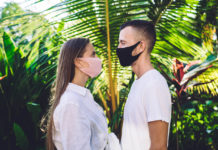
Seeing red? In the mirror, that is. Dry, red, irritated skin can be caused by a multitude of factors, but it can also be prevented and treated by natural means.
Seeing red? In the mirror, that is. Dry, red, irritated skin can be caused by a multitude of factors, but it can also be prevented and treated by natural means.
Your skin is unique
When trying to diagnose and treat irritated skin, it’s helpful to remember that our skin, like our personalities, isn’t always simple. Complex and oftentimes tricky, our skin can change depending on our age, the weather, our shifting hormones, and many other factors.
Our skin care routine can seem to be ticking along perfectly, when suddenly red skin can strike out of the blue. Fear not—we’re here to break things down and offer relief from dry, irritated skin.
Cold weather blues
The winter months are notorious for causing irritated skin. And it’s not just facial skin that pays the price—our poor hands suffer due to seasonal changes too.
Causes
Cold weather, wind, and harsh artificial indoor heat play havoc with delicate complexions, leading to dryness, redness, flaking, and even cracking. Ouch!
Treatment
- Switch up your lotion for a heavy moisturizing cream, or even a balm. Thick, waxy ingredients such as shea butter and beeswax help form a barrier to protect skin and keep moisture where it needs to be. Also wonderful are skin-loving glycerin and hyaluronic acid.
- Similarly, use a gentle, milky cleanser rather than a foam, and skip the alcohol-based toner.
- If your skin is flaking, a gentle exfoliant can help remove dead skin cells to reveal the radiant skin underneath. Look for products formulated for sensitive skin at your natural health retailer.
Prevention
- It’s easier said than done, of course, but the best course of action to avoid weather woes is to reduce your time in the elements. Wear gloves or mittens to protect your hands, and always apply a natural sunscreen when outdoors—remember: the sun’s glare off snow can be particularly harsh.
- Consider using a humidifier indoors to counteract the dry artificial heat.
The big three
Rosacea, eczema, and psoriasis are different chronic skin disorders that all benefit from a long-term treatment plan and professional evaluation. All can range from mild to severe.
- Rosacea is skin redness or flushing that typically affects the face.
- Eczema (atopic dermatitis) is skin inflammation that causes itchy, red skin.
- Psoriasis is skin inflammation that causes red elevated patches and flaking silvery scales.
Causes
Unfortunately, determining the causes of these conditions is not so simple. Environmental irritants, genetics, and immune responses are all thought to play a role.
- Rosacea flare-ups can be caused by stress, medications, and skin care products.
- Eczema is aggravated by irritants—either topical or environmental.
- Psoriasis triggers include stress, weather, hormones, and infections.
Treatment
Thankfully, all three conditions can be managed with the help of a health care professional. Treatment can include topical creams, medications, and even ultraviolet light therapy.
Prevention
In addition to avoiding triggers, researchers believe that modifying one’s diet or taking supplements may help to avoid flare-ups.
- Rosacea sufferers may find it helpful to avoid alcohol, dairy, spicy foods, and even chocolate.
- Although more research needs to be done, probiotics are thought to play a role in eczema prevention.
- Psoriasis sufferers may choose to increase their intake of fish oil, and reduce their intake of gluten, simple sugars, and saturated fats.
Curious to learn more? Reach out to a naturopath for a consultation.
Why so sensitive?
Contact dermatitis is the scientific term for skin that has an allergic reaction to a topical trigger. Many of us just call this “sensitive skin.” Technically, though, it’s a type of eczema. It can show up on any skin surface and typically presents as a red rash that can be itchy or even painful.
Causes
Dermatitis triggers can include
- fabrics
- laundry detergents or fabric softeners
- skin care products
- plants
- nickel, which is present in some jewellery and buckles
Treatment
Generally, contact dermatitis disappears hours, days, or even weeks after the irritant is removed. Cool, wet compresses can help soothe skin, as can an oatmeal bath. If the rash is severe or doesn’t go away, seek medical treatment.
Prevention
Avoidance of triggers is the best way to prevent contact dermatitis. If you’re not sure what’s causing it, keeping a diary of symptoms, skin care products, and any possible triggers can help uncover patterns.
Typically, those with skin prone to dermatitis of all kinds thrive when using simple products with minimal ingredients and fragrance. Some products formulated with colloidal oatmeal can also be soothing.
Ravishing with rosehip
Loved by Kate Middleton, Rose Byrne, and Miranda Kerr, rosehip oil is a skin care superstar! It’s often used for fighting sun damage, aging, and hyperpigmentation, and the reason lies in its phytonutrient composition.
Rosehip contains more ascorbic acid (vitamin C) than any other known fruit or vegetable, plus polyunsaturated fatty acids and carotenoids—with plenty of antioxidant activity. For best quality, choose organic, cold-pressed rosehip seed oil, available at natural health retailers.








